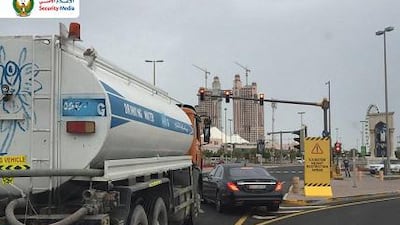ABU DHABI // Police and road safety experts have warned motorists of the dangers of switching lanes without warning and urged them to approach traffic junctions with caution.
Last week, the Ministry of Interior’s security media department released a picture of car suddenly pulling out at a junction at Marina Mall, cutting up a water tanker.
“A sudden lane change when approaching traffic lights is an objectionable behaviour, which compromises the safety of the driver and puts his life and the lives of other drivers at risk,” a ministry spokesman said.
Last year, sudden swerving of vehicles resulted in 143 deaths. Speeding led to 82 deaths and failing to leave a safe distance between vehicles caused 76 deaths on the country’s roads, said Brig Gaith Al Zaabi, director general of traffic co-ordination at the Ministry of Interior.
“Drivers making sudden lane changes by cutting in front of another vehicle are prone to sideswipe accidents, due to not paying attention or not being able to see the driver who is being cut off,” said Glenn Havinoviski, a US-based traffic expert. “They also risk rear-end accidents, where the driver being cut off is not able to stop in time.”
Unless there are witnesses to the incident “the driver who rear-ends the car who cut him off is generally considered at fault – implying that he was going too fast anyway and should not have hit him in the rear”, Mr Havinoviski said.
Tariq Awad, 52, an Abu Dhabi resident for 16 years, said he often saw erratic lane changes at traffic junctions.
“In my 13 years of driving here, I often come across reckless, inconsiderate and selfish driving,” he said. “The driver would turn abruptly, unmindful of the vehicle behind him or her.”
Sudden lane changing is caused primarily the driver not properly planning ahead while driving, said Robert Hodges, chief operating officer at Emirates Driving Institute in Dubai.
“The driver gets into a situation – often at too great a speed – where there is an impending impact he needs to avoid, or he needs to quickly change position. So he reacts instinctively, often in a reckless manner.”
“This causes a dangerous swerve,” Mr Hodges said.
Roshanara Sait, director of Ciel Marketing and Events, which organises road safety awareness campaigns, agreed.
“Such behaviour is totally irresponsible, rash and dangerous, putting their lives and the lives of others at high risk,” she said.
“One needs to plan the journey in advance and if for whatever reason a change is required, one still needs to stick with the road rules and change the route accordingly.”
Abu Dhabi has a grid network and for the most part if drivers miss one main road, they can turn at the next one.
“If one makes a mistake, he or she needs to follow the lane, at the next signal either turn around if permitted, or take the next parallel route,” said Mr Havinoviski, associate vice president of the US traffic management company Iteris.
“The Marina Mall junction is different because it is the only access from the Corniche to the mall.
“One thing that is helpful is if drivers get used to actually reading the directional signs ahead of the junction with street names and destinations.”
When a driver swerves, he or she normally has not gone through the necessary safety and observational routines, said Mr Hodges, a qualified driver education and road safety expert.
“The driver has no idea about what he or she is doing and whose space he or she is about to impact upon,” he said.
“Drivers need to scan proactively, use mirrors, check left and right over their shoulders to look at the blind spots on either side of their vehicle.”
rruiz@thenational.ae

